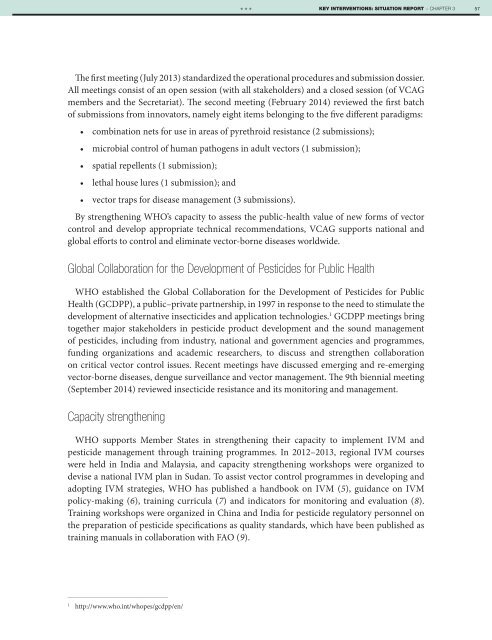1A9bnbK
1A9bnbK
1A9bnbK
You also want an ePaper? Increase the reach of your titles
YUMPU automatically turns print PDFs into web optimized ePapers that Google loves.
***<br />
KEY INTERVENTIONS: SITUATION REPORT − CHAPTER 3<br />
57<br />
The first meeting (July 2013) standardized the operational procedures and submission dossier.<br />
All meetings consist of an open session (with all stakeholders) and a closed session (of VCAG<br />
members and the Secretariat). The second meeting (February 2014) reviewed the first batch<br />
of submissions from innovators, namely eight items belonging to the five different paradigms:<br />
• combination nets for use in areas of pyrethroid resistance (2 submissions);<br />
• microbial control of human pathogens in adult vectors (1 submission);<br />
• spatial repellents (1 submission);<br />
• lethal house lures (1 submission); and<br />
• vector traps for disease management (3 submissions).<br />
By strengthening WHO’s capacity to assess the public-health value of new forms of vector<br />
control and develop appropriate technical recommendations, VCAG supports national and<br />
global efforts to control and eliminate vector-borne diseases worldwide.<br />
Global Collaboration for the Development of Pesticides for Public Health<br />
WHO established the Global Collaboration for the Development of Pesticides for Public<br />
Health (GCDPP), a public–private partnership, in 1997 in response to the need to stimulate the<br />
development of alternative insecticides and application technologies. 1 GCDPP meetings bring<br />
together major stakeholders in pesticide product development and the sound management<br />
of pesticides, including from industry, national and government agencies and programmes,<br />
funding organizations and academic researchers, to discuss and strengthen collaboration<br />
on critical vector control issues. Recent meetings have discussed emerging and re-emerging<br />
vector-borne diseases, dengue surveillance and vector management. The 9th biennial meeting<br />
(September 2014) reviewed insecticide resistance and its monitoring and management.<br />
Capacity strengthening<br />
WHO supports Member States in strengthening their capacity to implement IVM and<br />
pesticide management through training programmes. In 2012–2013, regional IVM courses<br />
were held in India and Malaysia, and capacity strengthening workshops were organized to<br />
devise a national IVM plan in Sudan. To assist vector control programmes in developing and<br />
adopting IVM strategies, WHO has published a handbook on IVM (5), guidance on IVM<br />
policy-making (6), training curricula (7) and indicators for monitoring and evaluation (8).<br />
Training workshops were organized in China and India for pesticide regulatory personnel on<br />
the preparation of pesticide specifications as quality standards, which have been published as<br />
training manuals in collaboration with FAO (9).<br />
_____________________<br />
1<br />
http://www.who.int/whopes/gcdpp/en/


